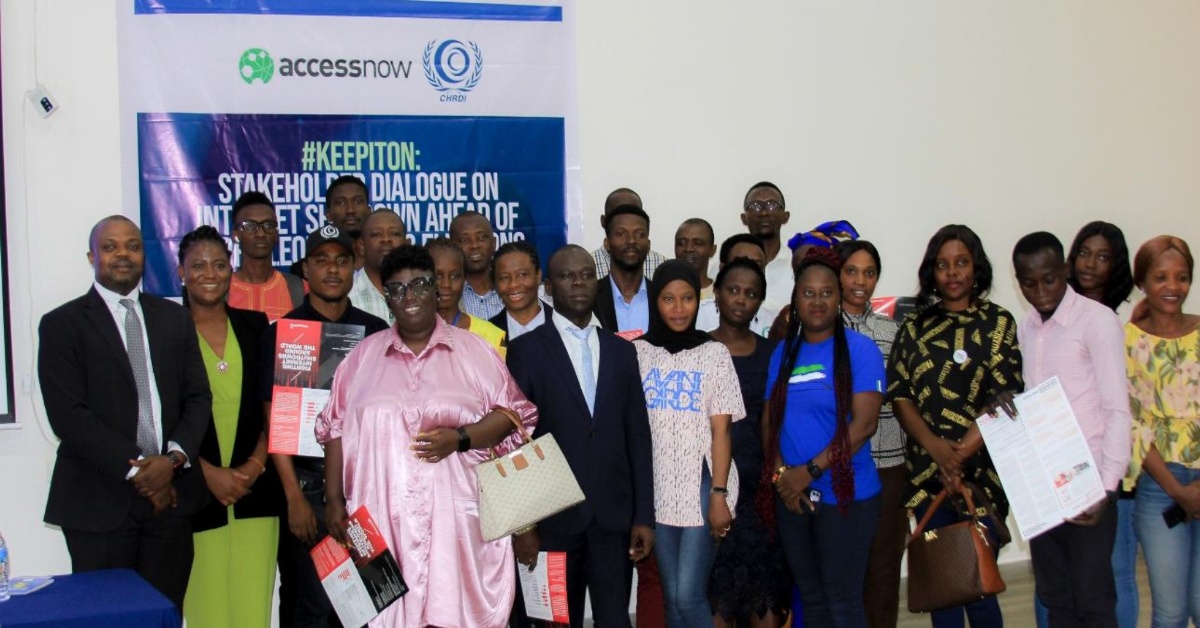CHRDI in collaboration with Access Now, (Keep it on), an international civil society organization (ICSO) that defends and extends the digital rights of people around the world, on Wednesday 21st June, held a one-day dialogue with stakeholders to address the issue of internet shutdowns ahead of the June 24 Elections.
The purpose of this dialogue is to foster a meaningful discussion among civil society and the media, focusing on the concerning issue of governments acts of weaponizing internet shutdowns during elections to disconnect, disenfranchise, and deny people their right to participatory democracy and access to information.
Speaking on behalf of ‘Access Now’ Felicia Anthonio, Campaign Manager ‘Access Now, expressed gratitude to all participants for taking the time to join the stakeholders’ dialogue during this crucial period.
Recognizing the vital role of the internet and digital platforms in various aspects of life, including education, healthcare, governance, and entertainment, the dialogue aimed to emphasize the importance of ensuring access to these platforms throughout the upcoming elections in Sierra Leone.
Governments around the world have increasingly resorted to internet shutdowns, intentionally disrupting or shutting down access to the internet and digital platforms.
This practice has become a growing threat to human rights and democratic principles globally. In 2022 alone, Access Now and the Keep It On (KIO) coalition documented 187 shutdowns in 35 countries, the highest number since 2016. Over the past seven years, they have documented over 1,000 incidents of shutdowns in approximately 74 countries.
Aside from being a violation of human rights, internet shutdowns during elections silence opposing voices, hinder the monitoring of elections by journalists, election observers, and human rights defenders, and raise concerns about the credibility and transparency of election outcomes. Shutdowns also exacerbate crises, widen the gender digital divide, enable human rights violators to act with impunity, and deny people access to critical information, emergency services, and livelihood opportunities.
Additionally, these shutdowns impose significant economic costs on nations, with businesses and institutions reliant on the digital economy suffering substantial financial losses.
Internet shutdowns not only violate national constitutions but also contravene international frameworks such as the International Covenant on Civil and Political Rights (ICCPR) and the African Charter on Human and People’s Rights.
The African Commission on Human and Peoples’ Rights (ACHPR) Resolution of 2016 recognized the importance of the Internet in advancing human rights in Africa and expressed concern about state parties interrupting or limiting access to telecommunication services.
Access Now and CHRDI called upon the government and all stakeholders in Sierra Leone, including President Julius Maada Bio, to commit to ensuring unrestricted access to the Internet and digital platforms before, during, and after the elections.
They urged the government to publicly assure the people of Sierra Leone that the internet, social media, and other digital communication platforms would remain open, accessible, inclusive, and secure throughout the country.
They further called for refraining from ordering disruptions to telecommunications services and for telecommunication and internet service providers to ensure high-quality, secure, and uninterrupted internet access during the election period and beyond. Additionally, they emphasized the importance of notifying internet users of any potential disruptions and promptly addressing any identified issues that could impact service quality.
As the June 24 Elections draw near, stakeholders are hopeful that the dialogue will foster a commitment to preserving internet access as a fundamental right and safeguarding the democratic processes in Sierra Leone.
The dialogue Concludewithht training of CSO reps, Journalists, and Young People on Internet rights and responses to Internet shutdowns



 2 Comments
2 Comments









Comment(s)
Disclaimer: Comments expressed here do not reflect the opinions of Sierraloaded or any employee thereof.